I was chatting with a reader last week and the topic of movie remakes came up.
Their gut feeling was that there has been a growing trend of remakes of movies from the 1970s. I had a similar feeling but felt that the most frequently raided era was currently the 1990s, due in part to all the Disney live-action remakes.
We agreed that neither of us actually knew and so I resolved to discover how long producers typically wait before plundering past productions in the pursuit of present profits.
I studied at all movies released theatrically in the US since 1990 and focused on the movies which are, in some way, a remake of a previous movie. There is more detail on my criteria and process at the end of the article.
How common are movie remakes?
Let’s start by taking a look at the prevalence of movie remakes.
I suspect that the average cinema-goer would guess that a significant proportion of “new” movies are remakes. However, the truth is that it’s a relatively small percentage – an average of just 4.2% of movies released between 1990 and 2019.
Even if we narrow the focus to recent years, it’s still just 4.5% between 2015 and 2019.
Part of the reason this feels low is that these statistics treat all films the same, whereas in practice some movies are more visible than others. Big budget Disney remakes garner far more airtime and attention than the huge numbers of independent films which are not remakes.
The chart below shows the percentage of movies in US cinemas that would be counted as movie remakes by my criteria. I have added a dotted trendline to give a rough sense of change although, given the small numbers involved, we can’t draw huge conclusions from this.
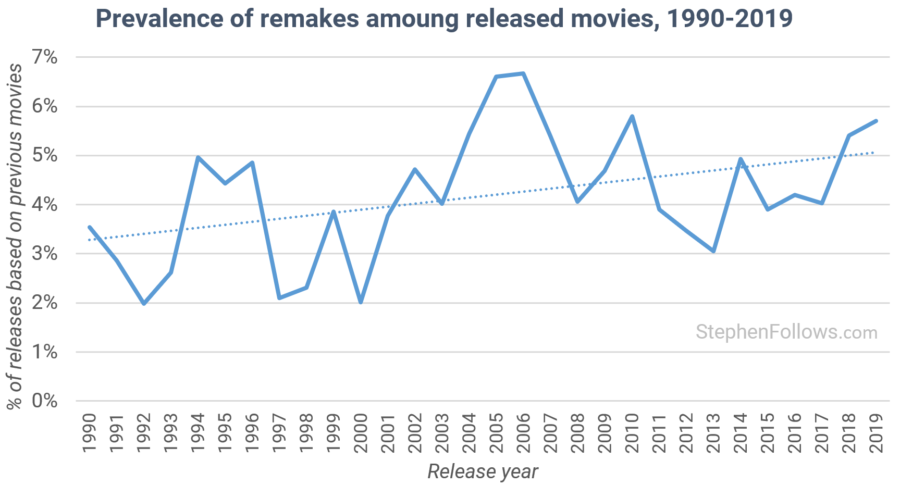
Which era do most remakes come from?
So now that we have identified the movie remakes released over the past three decades, let’s look at when their original versions were first released.
Each orange dot on the chart below is a movie, with the horizontal axis showing when the remake was released and the vertical axis showing when the original it was based upon was first released.
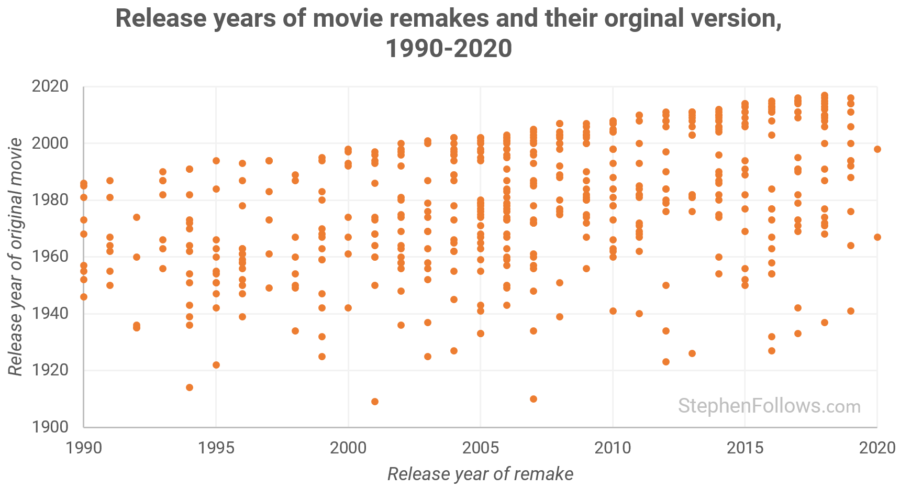
If you don’t see a clear pattern, you’re not alone. Movie remakes don’t seem to come from mostly one period.
A pattern I do see is that they come in two waves, with a cluster of remakes released within a few years of their original, then a gap and then a much more spread-out pattern of origin years. More on that in a moment.
What is the average delay between the orginal and remake?
At this stage, it might be handy for us to focus on the delay between the release of the remake and its original. For example, the live-action CGI movie The Lion King was released in 2019 and was based upon the animated movie The Lion King from 1994, giving it a delay of 25 years.
Over the past thirty years, the average delay has fluctuated between 44 years (in 1992) and 17.1 years (just one year later in 1993). Across this period the overall average was 27.2 years. This is roughly what most people regard as “a generation” meaning that the remake should evoke childhood nostalgia from current parents, hopefully increasing the pool of interested consumers.
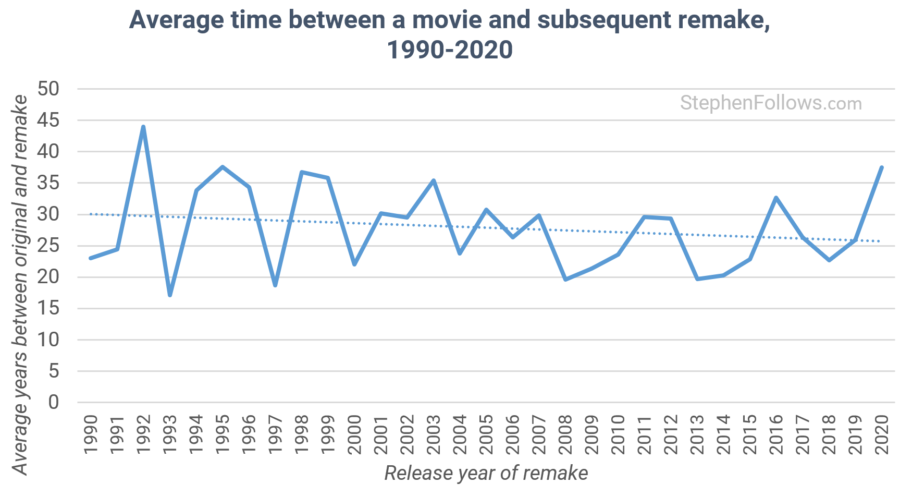
The two types of movie remakes
Previously I noted the two ‘waves’ of releases that seem to be present in the scatter plot. To show this more clearly, the chart below uses the same data, but groups the delay into one of five buckets:
- The remake is released within five years of the orginal film
- Six to ten years
- Eleven to fifteen years
- Fifteen to twenty years
- More than twenty years
This shows us that a fifth of remakes are released within five years of their original.
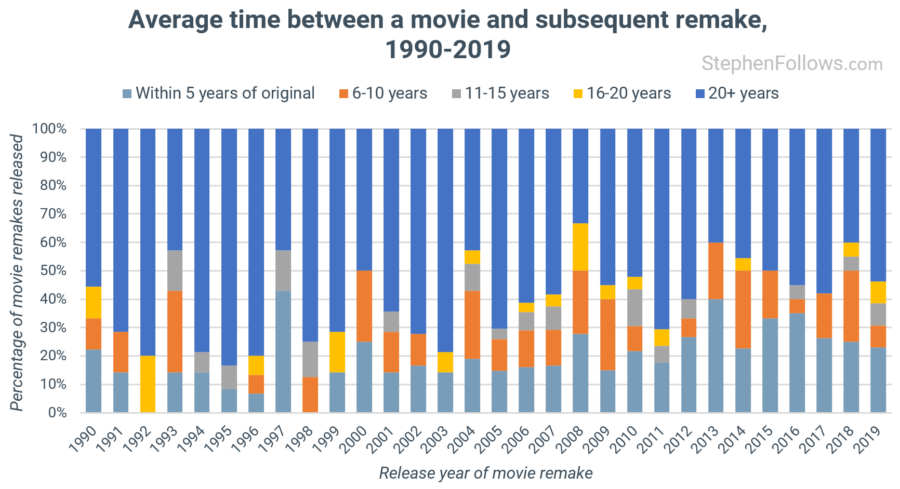
This is because there are two types of remakes:
- New Audience. This is when a movie is remade in order to bring it to a new audience or market, typically with the remake being an English-language remake of a “foreign” film. A few examples include the 1995 US remake of Nine Months from the 1994 French movie Neuf Mois and the 2004 US remake of The Grudge from the 2002 Japanese movie Ju-on (which was then again remade in 2020).
- New Era. These are remakes aimed at engaging a new generation of cinema-goers, as well as hoping to bring back the orginal watchers curious to see what Hollywood has done to their precious childhood memories. Recent examples include Ghostbusters (1984 and 2016), Point Break (1991 and 2015) and A Star Is Born (1937, 1954, 1976 and 2018).
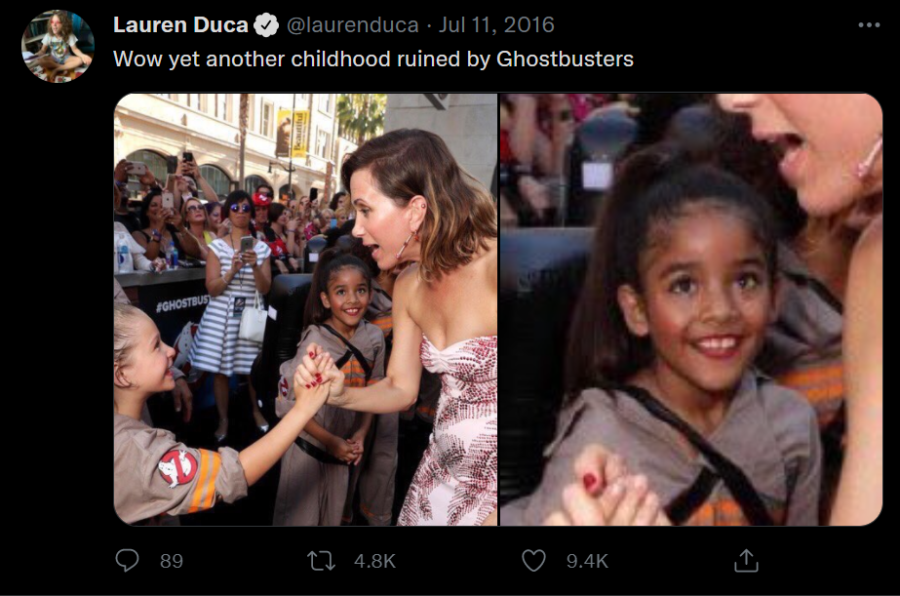
Notes
The raw data for today’s research came from IMDb, Wikipedia and The Numbers. The criteria for movies released between 1990 and 2019 (inclusive) was that they needed to have grossed at least a dollar at the US theatrical box office. The recent pandemic made it impossible to apply the same standard to 2020 movies, and so for that year alone, I included all movies released by each of the five major Hollywood Studios.
Defining a “movie remake” is harder than it first seems, for a number of reasons;
- Mixed sources. Movies can have multiple sources, such as a remake of a true-life story with additional details from licensed books or articles.
- Many movies. A movie can take elements from multiple movies, as Scorsese did with The Departed which takes elements from Infernal Affairs, Infernal Affairs II and, yup you guessed it, Infernal Affairs III.
- Previous adaptations. A movie may be based on a source material (such as a book) that has previously been adapted into a movie. The new film could take a similar approach to the adaptation as the first film (adding to the case that it does qualify as a movie remake) or alternatively tell the events in a different way (thereby changing its classification to a book adaptation).
- Name only. Films can be ‘rebooted’, whereby significant elements are changed, such as the rather tenuous links between the 1969 and 2003 versions of The Italian Job.
This means I doubt we can ever create ‘The Definitive List of all Movie Remakes’ on which we can all agree. There are just so many fringe cases, not to mention that I haven’t seen all the movies myself so couldn’t act as a judge in all cases. For today’s research, I used IMDb’s ‘Connections’ classification, unless I knew it to be egregiously wrong.
This means that in a few cases we have films classed as ‘remakes’ when they are adaptions of a book that have previously been made into a movie. In other cases, when there were multiple previous productions of an idea or story I took the year of the first (i.e. oldest) movie.
The complicated classification criteria and the resulting low numbers of movies make me slightly uncomfortable when talking about firm trends and averages. Therefore, today’s findings should be seen as interesting rather than definitive or relied upon too heavily.
It’s worth noting that a sequel, prequel or spin-off movie would not count as a remake. If you want to read more about these topics, here are some of my past projects which may interest you:

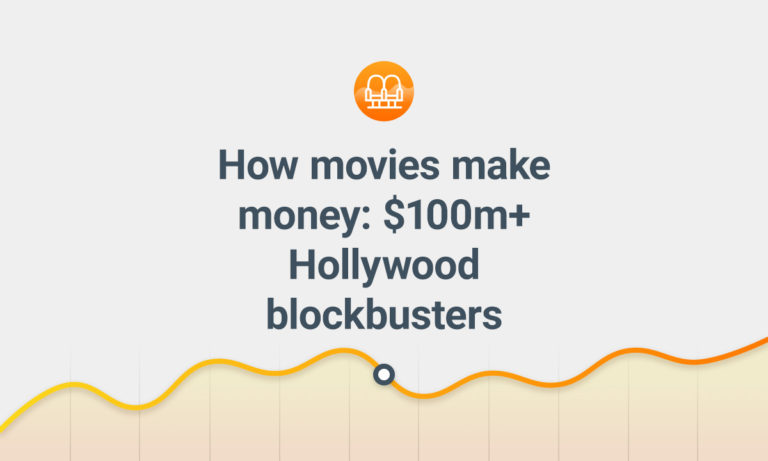
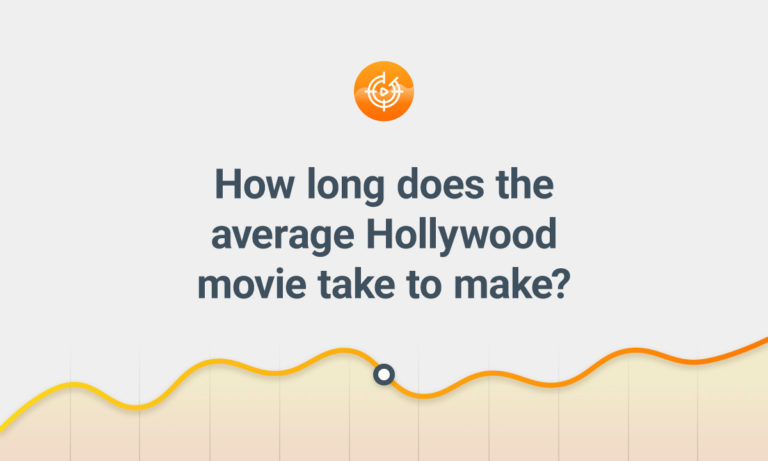


Comments
Fascinating research, as always, Stephen!
I do think people tend to overestimate how many remakes there are nowadays compared to previous decades. I’d be super interested in seeing these numbers in particular for classic Hollywood, as it seems to me remakes might have happened at even shorter intervals there – after all, pre-TV and home video, films could be rehashed more often without that seeming too odd. But the problems you mentioned with the reliability of the data would likely be even more of a problem for research farther into the past.
A slight correction, I think you meant 25 years (rather than 15) have passed between the animated and live-action versions of The Lion King.
It feels a bit of a disservice to the phenomenonal animators and artists that 2019’s The Lion King is considered “live action.”
That is a VERY fair point. I’ll update it. Thanks for pointing it out
Dear Stephen,
I can not describe how valuable your website is to a film enthusiast like me. I first stumble upon your website back in 2015 when I was searching for article “costs and income of a $1m independent feature film”. It blew my mind how detailed and analytical the article was with all the data. And to make things even better it is free. I hope you have all the success in the world. And If some day hopefully I get to release my independent movie, I will be sure to credit you.
How frustrating that there isn’t a clearer trend. I expected the last couple of years to have more remakes than ever, but it seems that the biggest bulge on your graph is 2005-2006.
Still, thank you very much for doing the research – it’s lovely to have a fresh analysis.
I’d love to see this data before 1990. After all, the most famous versions of The Ten Commandments and The Man Who Knew to Much are both remakes (from the same directors, even!). These would likely create another category, being technological advancement; the originals were black and white (and in the case of 10 Commandments, silent), and their remakes in full color.
I suspect you’ll find remakes have been around for almost as long as Hollywood itself.